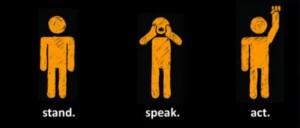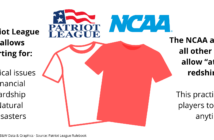
Courtesy of Lehigh University department of Health Advancement & Prevention Strategies
The Bystander Intervention Initiative is a Student Affairs program aimed at educating the community with tips about intervening in difficult situations and encouraging bystanders to proactively addresses issues that arise when they are present.
“Our goal now is to create a single program/model with effective, consistent and comprehensive messaging for campus wide integration,” wrote Pete Costa, the director of the Health Advancement and Prevention Strategies and committee member of the Bystander Intervention Initiative, in an email.
To get students involved with this initiative, Student Affairs decided to host a competition and is seeking a title, logo and tagline for the initiative. The winners for best title, best logo and best tagline will be chosen by the Bystander Intervention planning committee and will receive $100 Amazon gift cards as prizes. The design competition is open to Lehigh students, faculty and staff.
The competition itself may not necessarily help students intervene but may be more of a promotional effort to advertise the program, Kirsi Balaz, ’18, member of Break the Silence, said.
“We wanted the students to feel like they had ownership in this program because at the end of the day, it is all for them,” Brooke DeSipio, member of the Bystander Intervention Initiative and director of the Office of Gender Violence Education and Support, said. “We really wanted it to sound and feel like Lehigh students.”
According to Lehigh University National College Health Assessment for Spring 2015, 45 percent of Lehigh undergraduate students reported witnessing hazing and intervened by trying to stop it or by talking about it with a professional staff member, teammate or friend. Those who did not intervene marked the most important reason they did not do so as “assuming it was not a problem,” and “not knowing how to intervene.”
The Bystander Intervention Initiative aims to change these statistics and encourage students to not be a bystander. Through education, skills training, campus policy and messaging, the group works to increase student’s motivation and confidence to helps others in problematic or potentially problematic situations.
“A major component of this program will be to help people understand that determinants of pro-social behavior and why they sometimes don’t help,” Costa wrote. “As a result, they are more likely to help in the future.”
The statistics on how many Lehigh students intervene in these types of situations are self-reported and collected from Lehigh students annually via the National College Health Assessment.
Data is collected on how often students witness certain situations, whether they intervened, why they chose to respond or not to the situation and if they feel they have the skills to intervene in such situations.
Hundreds of colleges, universities and organizations across the country, including Lehigh, use Step Up! materials as a basis for their bystander training. Step Up! is a pro-social behavior and bystander intervention program that provides education to help others intervene when situations arise. The Step Up! program gives universities the concepts to work with, but then leaves it to the university to take its messaging and make it their own by creating university-specific taglines, logos and names.
“The Step Up! model is great, but we wanted this to be Lehigh specific,” said DeSipio. “We know that you can’t just take a national program and plop it into your campus. You have to make it unique to your campus and make it your own.”
The goal of the program is for students to be able to see there are times where they might not have thought they should intervene but should have.
“It’s hard because this campus has such a big social atmosphere that it can be hard to distinguish normal social behavior and what should be given more attention or what students should worry about or consider intervening about,” Balaz said.
With new programs added each year, the program aims to empower students to be proactive when confronting issues of hazing, sexual assault, inclusion and social justice.
“We empower students in feeling to take action and intervene on behalf of their values and beliefs,” Costa wrote.





Comment policy
Comments posted to The Brown and White website are reviewed by a moderator before being approved. Incendiary speech or harassing language, including comments targeted at individuals, may be deemed unacceptable and not published. Spam and other soliciting will also be declined.
The Brown and White also reserves the right to not publish entirely anonymous comments.